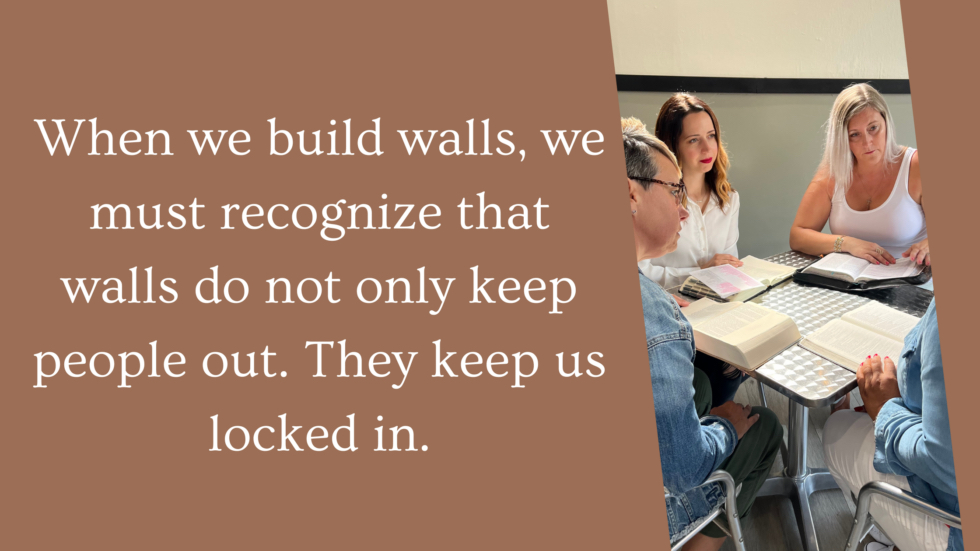If it’s one thing I talk a lot about with the women in the Untangle Your Thoughts program, it’s this, helping them walk through forgiving themselves for the mistakes they have made. To forgive yourself is to receive what Jesus did on the cross, but there is also another step to that.
We know God forgives us of our sins through Jesus, but we continue to carry the weight of the sin.
We think we have to get ourselves right before we go to God. With this belief, we isolate ourselves. (Or when other people make mistakes and hurt us, we isolate and swear ourselves off from friendship or any kind of connection that could possibly hurt again.)
Making mistakes suck. It’s the last thing we want to do, but it’s also something we can’t seem to let go of when we do.
“See, I’m never going to get it right,” We convince ourselves.
“What’s the point anymore,” As we try to keep ourselves from drowning in our own self-loathing.
When you forgive yourself, you walk out healing with compassion. This compassion isn’t self-focused, either, but one led by the Holy Spirit.
By the way, what if I told you your feelings aren’t inherently bad or sinful? You don’t need to fear or suppress them. They can be a guide. If you’re interested, I have a free 3-day study on living by faith while processing emotions. Check it out here!
How to Forgive Yourself and Move Forward in Faith
Forgiving oneself through scripture means seeking guidance and wisdom from the teachings of the Bible to overcome feelings of guilt, shame, and self-blame. Scripture offers numerous examples of forgiveness, both from God and from others, and provides guidance on how to extend that same forgiveness to ourselves.
One example of self-forgiveness through scripture is found in 1 John 1:9, which states: “If we confess our sins, he is faithful and just and will forgive us our sins and purify us from all unrighteousness.” This verse reminds us that when we confess our sins to God, He will forgive us and cleanse us of all unrighteousness. It is important to believe in the power of God’s forgiveness and to trust in His grace and mercy.
Another example can be found in Philippians 3:13-14, which states: “But one thing I do: Forgetting what is behind and straining toward what is ahead, I press on toward the goal to win the prize for which God has called me heavenward in Christ Jesus.” This verse encourages us to focus on the future and to let go of our past mistakes. By shifting our focus to the future and our goals in Christ, we can move forward with a renewed sense of purpose and hope.
In addition to these verses, there are many other scriptures that provide guidance and encouragement for self-forgiveness. By studying and reflecting on these teachings, we can find the strength and wisdom we need to forgive ourselves and move forward in faith.
God’s Unconditional Love: A Path to Forgiving Yourself
One would argue that we shouldn’t have to walk through the process of forgiving ourselves because it’s not in the Bible.
We are forgiven and receive forgiveness for our sins through Jesus. (All of which is true.)
The release of our shame and guilt doesn’t hinge on our ability to forgive ourselves. Our freedom from the strongholds we carry comes through the cross’s power.
We should feel bad about sin. (It’s why we also experience guilt.) We should be sorrowful over our failures. However, this sorrow should lead to repentance, and then when forgiveness is received, our sorrow should be cast upon the Lord (Isaiah 53:4). It’s a kind of sorrow or shame that leads us to conviction, leading us to repentance and turning to God, not away from God.
We cannot set ourselves free from any sinful habit we have in our life because Jesus set us free already. We aren’t striving to be set free we are renewing our minds to stay free.
Through scripture, we see two types of forgiveness—the forgiveness of our sins and the forgiveness of others.
Colossians 3:12-13 shares both with us, “Therefore, as God’s chosen people, holy and dearly loved, clothe yourselves with compassion, kindness, humility, gentleness and patience. Bear with each other and forgive one another if any of you has a grievance against someone. Forgive as the Lord forgave you.”
Ephesians 4:32 also shares, “Be kind and compassionate to one another, forgiving each other, just as in Christ God forgave you.”
Maybe what we need to work on with ourselves is having compassion for ourselves through the mistakes we make, knowing we live in a fallen world and we sometimes sin.
We can’t “forgive” ourselves, but we can show compassion, patience, kindness, and gentleness towards ourselves in the healing process through the choices we make.
We can use kind words towards ourselves.
We can learn to be patient when we are learning and don’t make the right decision.
We can be gentle with our pain instead of shoving our pain away somewhere.
If our goal is sanctification and becoming more like Christ, how can we extend compassion toward others and not toward ourselves?
If we claim to love Jesus and believe He loves us, then why would we continue to trash-talk ourselves?
*I know how hard walking through this process of forgiving yourself can be. If anger is an emotion that keeps coming up, get my biblical study on anger.
Biblical Study on Forgiveness eBook
$5 Does it feel impossible to live without holding a grudge? Is it hard to imagine being able to forgive yourself? In this biblical study on forgiveness, Jessica offers a clear and workable guide to understanding and practicing forgiveness according to the Bible. Carrying the reader from the heartfelt call to repentance in Acts 3:19…
The Power of Forgiveness in the Bible
Paul, in many ways, set an example of forgiving oneself. He had been a violent persecutor of the church. But rather than live in shame and regret over what he’d done, or think that God could not use him, or constantly remind himself of his sin, he spread the gospel.
This was not Paul trying to make up for his past. Rather, it was out of understanding God’s great salvation. Paul writes, “Here is a trustworthy saying that deserves full acceptance: Christ Jesus came into the world to save sinners—of whom I am the worst. But for that very reason I was shown mercy so that in me, the worst of sinners, Christ Jesus might display his immense patience as an example for those who would believe in him and receive eternal life. Now to the King eternal, immortal, invisible, the only God, be honor and glory for ever and ever. Amen” (1 Timothy 1:15–17).
Paul’s sin actually became an avenue by which God was glorified. Rather than refuse to forgive himself, Paul readily received God’s forgiveness and rejoiced in it.
Our culture has rejected all “negative” emotions. However, God gave us the capacity for these negative emotions, and there is a proper use for them.
When a negative emotion and feeling arise about our mistakes, we get to turn to God in all our pain and sorrow and imperfections to confess and repent. This frees us of the shame and guilt. It’s no longer ours but His.
There is beauty in honoring our past stories without them becoming our identity, our worth, the lens we view the world through, or our future. Our past may be trying to tell us something right now (according to how our body responds and reacts with fight or flight).
Take a deep breath, let go of the pain, and forgive yourself for the choices you made.
Letting Go of the Past and Embracing God’s Plan: Forgiving Yourself
What does this look like practically? When we acknowledge our anger from the hurt someone caused us, and we forgive the one who hurt us. We acknowledge our anger is there, but we refuse to live in that anger despite what our feelings and flesh are telling us.
When someone cuts us off when driving and we don’t tail them to get them back.
When someone says something hurtful to us, we don’t retaliate with the same kind of words.
How do we walk through compassion towards ourselves and also not build a wall around our hearts?
Let’s take a look at 2 Corinthians 7:10-11, “For godly grief produces a repentance that leads to salvation without regret, whereas worldly grief produces death. For see what earnestness this godly grief has produced in you, but also what eagerness to clear yourselves, what indignation, what fear, what longing, what zeal, what punishment! At every point you have proved yourselves innocent in the matter.”
Paul rejoiced that the Corinthians were made sorry in a godly manner; their sorrow led them to repentance. Because of this response, further discipline from Paul was not required. Changing the narrative from forgiving yourself to clothing yourself with kindness and humility can lead us to repentance.
When we build walls, we must recognize that walls do not only keep people out. They keep us locked in.
Need help managing the mental stresses of life? Join me in my member community focused on living with less stress and living free!
What Does the Bible Say About Forgiving Yourself
Taking a further look at 2 Corinthians 7:10-11, it tells us that there is a godly type of sorrow and an ungodly type of sorrow. Godly sorrow leads to repentance. Ungodly sorrow, or the sorrow of this world, kills us.
I love this breakdown from my Bible commentary.
Our culture has rejected all “negative” emotions. However, God gave us the capacity for these negative emotions, and there is a proper use for them.
Ecclesiastes 7:3 says, “Sorrow is better than laughter: for by the sadness of the countenance the heart is made better.”
We should feel bad about sin. There should be sorrow over what we do wrong. However, this sorrow should lead to conviction and repentance, and then when forgiveness is received, our sorrow should be cast upon the Lord (Isaiah 53:4). Forgiving yourself isn’t something you did or do alone. You heal with the Lord.
The Lord’s statements to His disciples, the night before His crucifixion, caused them sorrow (Matthew 26:21-22 and John 16:6). Peter’s sorrow after his denial of Jesus changed him, and certainly, he never regretted those tears he cried. The sorrow experienced by those who do not turn to God produces only death. They grieve over their situation because they don’t turn to God (that’s repentance). Christians should only have sorrow until they repent.
The word repentance in the Bible literally means “the act of changing one’s mind.” True repentance results in the radical and persistent pursuit of holy living and walking with God in obedience.
Repentance in the Bible involves a complete change of mind, heart, and actions. Renewing our minds and repentance go hand-in-hand. We can’t renew what we aren’t aware of, and we can’t change what we don’t confront.
Therefore, our sorrow can produce death in our life versus holy living. (Which is displaying God’s characteristics to the world.)
It’s the “goodness of God that leads us to repentance.” (Romans 2:4)
Those who come to God because of His goodness will see God as the source of their success and continue to serve God in the good and the bad times.
The Gospel uses God’s great love to draw us unto God. (Remember, forgiving yourself isn’t the goal.)
Paul, in Philippians 3:13–14, reminds us to look forward, to look up to heaven, and not on the road behind us: “Brethren, I do not count myself to have apprehended; but one thing I do, forgetting those things which are behind and reaching forward to those things which are ahead, I press toward the goal for the prize of the upward call of God in Christ Jesus.”
Jesus invites us to sit at the table. We don’t have to bring anything. I don’t want to walk away from the table with anything less than what He died for me to have. We get everything He brings to the table. Forgiving yourself is healing with the Lord and changing the way you view forgiveness.







For decades I have been struggling with how to forgive myself. I couldn’t figure out how to do it. I now realize that instead of trying to forgive myself I simply need to accept the Father’s forgiveness which has been there all along. Trying to forgive myself feels like “striving” vs. accepting the Father’s forgiveness. This may look like a minor distinction but for me it’s huge. In trying to forgive myself I rehashed the event over and over again. Accepting the Father’s forgiveness means it is done. As someone pointed out earlier it was and is my pride that thought I could “forgive myself.”
Praise God!
1 Corinthians 13:4-5 As the failure to forgive ourselves hinders our love of others, so our love for others can facilitate self-forgiveness.